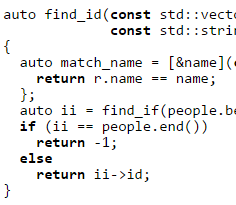Quick Q: Why can I return a unique_ptr by value? -- StackOverflow
Quick A: Because return local_obj; automatically treats it as an rvalue. After all, you won't be using it any more.
When this FAQ came up again recently on SO, the answer was to refer to this previous Q&A:
Returning
unique_ptrfrom functions
unique_ptr<T>does not allow copy construction, instead it supports move semantics. Yet, I can return aunique_ptr<T>from a function and assign the returned value to a variable...unique_ptr<int> foo() { unique_ptr<int> p( new int(10) ); return p; // 1 //return move( p ); // 2 }The code above compiles and works as intended. So how is it that line
1doesn't invoke the copy constructor and result in compiler errors? If I had to use line2instead it'd make sense (using line2works as well, but we're not required to do so)....

 Freshly pressed from Andrzej:
Freshly pressed from Andrzej: One reasoned take on the various error reporting mechanisms in C++ and a policy for deciding when each is appropriate:
One reasoned take on the various error reporting mechanisms in C++ and a policy for deciding when each is appropriate: Look at this image again: That's C++ in Lisp. And that's just for starters...
Look at this image again: That's C++ in Lisp. And that's just for starters... Recently on Tales of C++:
Recently on Tales of C++: Today on Dr. Dobb's:
Today on Dr. Dobb's: